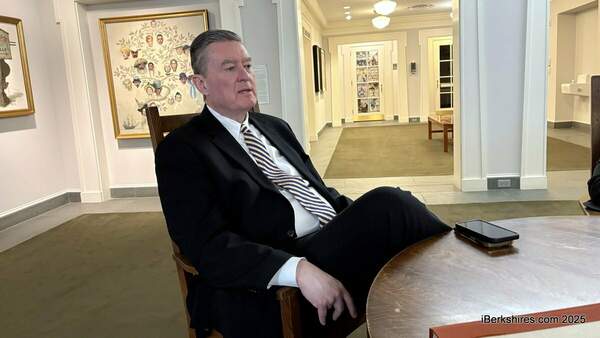BRPC Chugging Along With Railroad Station Study
 The full commission was briefed on the project on Thursday. The full commission was briefed on the project on Thursday. |
PITTSFIELD, Mass. — County planners are looking to conclude a study of possible passenger train stations by September.
Berkshire Regional Planning Commission is in the middle of determining locations for train stations from Pittsfield to the Connecticut border. The state is looking to re-establish a passenger rail line to New York City.
Planner Brian Domina outlined the progress and process Thursday saying the ultimate goal is to identify the number and locations of stations, complete with drawings rendering what amenities would be at the stations.
Domina said the study has begun with just identifying areas of land with 500 feet of the rail line and then eliminating sites that cannot be developed.
"We have 1,885 acres of developable land within the stretch," he said, adding that 2,500 acres had been eliminated.
The parcels eliminated had steep slopes, protected open space, lack of access to the rail or wetlands issues.
From there, the study looked at five environmental issues: wetlands, the 100-year floodplain, habitat for endangered species, areas of critical environmental concern and Housatonic River watershed priority lands. A total of 842 acres did not have any of those restrictions and 16 acres had all of those.
The next step is to looking at siting to see if each town were to have a station, where it should be located. Planners are looking at economic impacts, access, conformity with community planning efforts, community character, operational constants and environmental impacts. For example, in Pittsfield, they looked at four areas for a possible station and scored them yes or no on such questions as their proximity to retail, highways and cultural attractions.
In this step, the organization will be meeting with town officials and residents to hear their concerns and ideas to find the best spots in each one.
"We want to be on the same page with the communities with what we are recommending," Domina said.
After that, they'll be trying to determine how many stations there should be and ranking the locations. In that phase, he will be looking at impacts like traffic, economics and property values.
Meanwhile, Housatonic Railroad, which owns the tracks, is refining its ridership forecast and identifying track improvement needs. Domina said the tracks will need a "soup to nuts" renovation because they were mostly built in the 1920s.
Finally, all of that work will be put together for recommendations of design, ownership of the station options and sketches and narratives of preliminary site plans.
Working meetings with the communities along the rail line, with six more to go, should be completed in February. There will be two subregional public information meetings and, in August, Domina expects to release a draft plan. The final report is due in September.
Planners did have to stop the research for about a month after the state placed a stop-work order. Several community working meetings had to be canceled and are now being rescheduled. The stop-work order has since been lifted.
The study is being paid for with a $240,000 federal grant and Housatonic Railroad is contributing $60,000 of in-kind work.
Tags: passenger rail, rail station, railroad,















